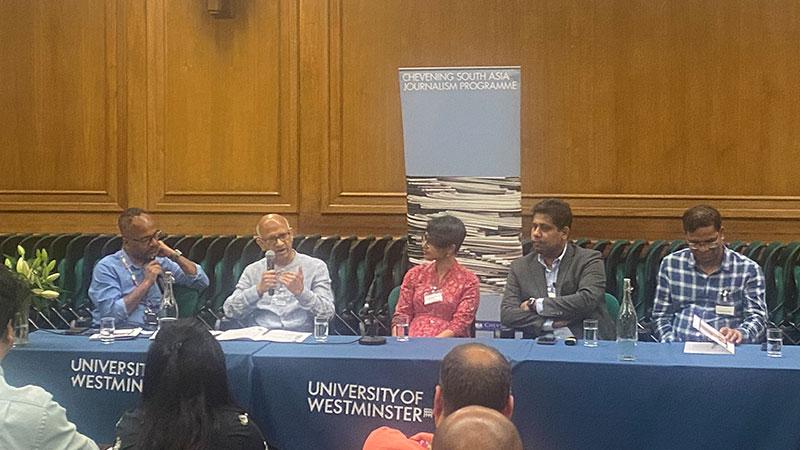The University of Westminster has hosted the Chevening South Asia Journalism Programme (SAJP) Symposium 2024. Organised by this year’s programme participants, journalists and technology experts from across the globe joined together to discuss the lessons the UK can learn from South Asia’s elections and explore whether democracy is safe in an ever-increasing technological world.

The event took place on 5 June in Portland Hall and was organised by the SAJP Fellows. The SAJP course is the only one run by the Foreign, Commonwealth and Development Office (FCDO) that brings Indians, Pakistanis, Bangladeshi and Sri Lankan senior high flying journalists together who cannot otherwise meet across contested and fractious borders. It is a seven-week programme run within the University of Westminster’s School of Media and Communication and is led by Professor Jean Seaton, Professor of Media History at the University of Westminster; Professor Rosie Thomas, Professor of Film; and Research Associates from Westminster’s School of Media and Communication Dr Daisy Hasan and Eleanor Weber-Ballard.
The programme addresses significant concerns for journalists in the region, including the widespread challenge of misinformation and disinformation, the rise of AI technology and threats to democracy. The symposium was a culmination of the unique learning experiences and conversations that the Fellows have taken part in during the seven weeks.
Throughout the day there was a variety of panel discussions moderated by members of the SAJP. The theme of this year’s symposium was Good Governance in a Changing World: Disorders of Information and Democracy, with a special focus on AI and elections. For the Fellows the symposium was an opportunity to open these topics up to a wider audience and to engage in discussion with experts they admire.
The first panel explored how AI can play a part in elections and what the UK can learn from the AI techniques used in South Asia. The speakers were Amogh Dhar Sharma, Departmental Lecturer in Development Studies at the University of Oxford, Sam Stockwell, Research Associate at the Centre for Emerging Technology and Security at the Alan Turing Institute in London, and Tim Gordon, the founding partner of the AI and governance consultancy Best Practice AI. It was chaired by Sadaf Modak, Senior Journalist at The Indian Express.

The second panel discussed the emergence and rise of jinfluencers – journalists who have become influencers to create an alternative space for independent journalism. The panellists were Akash Banerjee, an Indian jinfluencer who runs one of India’s largest YouTube channels The Deshbhakt, a satirical show that focuses on social, political and environmental issues. He was joined by Meenaskshi Ravi, a journalist and executive producer with Al Jazeera and Professor Dibyesh Anand, Deputy Vice-Chancellor for Global Engagement and Employability at Westminster. It was moderated by Namini Wijedasa, Deputy Editor of The Sunday Times in Sri Lanka.
For the third discussion, the panel included Bulbul Hasan, British-Bangladeshi Journalist and Editor of E-South Asia, Saqlain Imam, Former BBC Journalist and Political Analyst, Meghana Choukkar, Research Affiliate at Kings College, London, and Dr Arvind Kumar, a Lecturer in Sociology and Criminology at Royal Holloway, University of London. Chaired by Sagar, a Senior Journalist at The Caravan, the group explored media ownership, methods of government or military coercion and how South Asian media industries pander to their governments.
The final panel delved into the question of how democracies will function in the new age of tech. Joining the panel chair Anisha Dutta, New York-based Investigative Journalist, was Ayesha Siddiqa, Senior Fellow in War Studies at King’s College, London, Anbarasan Ethirajan, South Asia Regional Editor at BBC News in London, and Professor Nitasha Kaul, Professor of Politics and International Relations and Director of the Centre for the Study of Democracy (CSD) at the University of Westminster.
The event concluded with a drinks reception where panellists, SAJP Fellows and attendees had the chance to network and continue exploring the themes of the day.
Professor Jean Seaton said: “This high powered day of discussion organised by our wonderful SAJP fellows un-picked some of the new gathering threats to democratic freedoms in South Asia that AI and information technology bring. It was salutary yet hopeful - after all the Indian electorate had acted with some independence in diminishing Mr Modi's hold on power. The day was the culmination of weeks of visits to the Financial Times, the Economist, the BBC, the Liverpool Echo, the Guardian and to theatres and galleries and conferences and discussions with journalists and experts, and the sheer fun and exhilaration of unfettered exchange.”
This event directly contributes to the United Nations Sustainable Development Goal (SDG) 16: Peace, Justice and Strong Institutions, as it explored key solutions to maintaining democracy and objective and transparent media. Since 2019, the University of Westminster has used the SDGs holistically to frame strategic decisions to help students and colleagues fulfil their potential and contribute to a more sustainable, equitable and healthier society.
Find out more about the Chevening Scholarships and studying Media and Communication at the University of Westminster.





